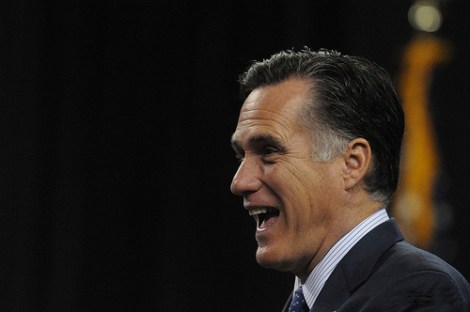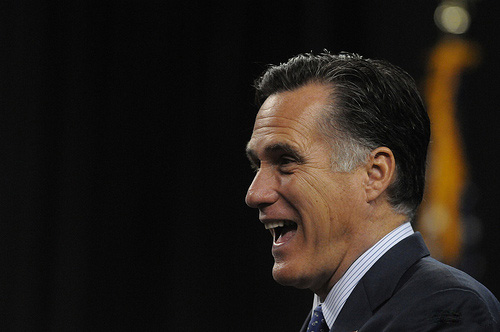Mitt Romney’s big energy policy proposal, which he will announce today at around 1 p.m. Eastern, was released last night. Lisa Hymas looked at the toplines shortly after it came out (summary: oil oil gas oil); here’s a deeper dive.
This is the document that leaked. Note: It could change by the time Romney gives his speech. Perhaps the utility of renewable energy and leading in the green space came to Romney in a dream or something. But given how closely this paper hews to our prediction, I think it’s a safe bet to take it as final.
Please note that most of this is links to news articles from the liberal media.
The short version: Romney pledges energy independence by 2020. It’s important to note, though, that he doesn’t pledge American (Amercian) energy independence by that date; rather, he proposes North American independence. Does this mean that Romney advocates for a united Canada-U.S.-Mexico, a North American Union? Ron Paul was right!
Romney’s agenda is summarized and annotated below. (All headers are language from Romney’s proposal.)
“Empower states to control onshore energy development”
In short, Romney wants states to have the ability to open federal land within their borders to extraction and to have full control over the permitting process. The feds would then rubber-stamp the state plans. It’s basically the Tenth Amendment, applied to oil drilling.
There’s a reason that the federal government has a legitimate role in monitoring extraction and resource development: Pollution and impacts don’t stop at state lines. It’s why the EPA is trying to figure out how to regulate cross-state air pollution. Air doesn’t care about borders.
And then there’s the obvious problem: Do residents of Florida want Georgia to build a series of unsafe oil derricks off its coast? Will any state still want to border Texas? Hard to see how this doesn’t result in a production boom — of complaints and lawsuits filed in federal courts.
“Open offshore areas for energy development”
Drill more offshore — because offshore drilling is flawless and always safe! Romney proposes starting with the coast off Virginia, FYI Virginia.
“Pursue a North American Energy Partnership”
This is the key section. Romney wants to approve Keystone XL and craft a “regional agreement” that facilitates cross-border infrastructure — all with a “fast-track” (read: highly limited) approval process.
This basically acknowledges that energy independence is actually a pipe dream over any reasonable time period, and undermines the long-standing Republican argument that we can drill our way to such independence. Now we have to partner with Canada and Mexico? Why does Mitt Romney hate America?
“Ensure accurate assessment of energy resources”
Romney proposes updating seismic surveys and other geological assessments — basically so that oil companies can figure out the best places to drill. By arguing that the government should do these surveys, Romney proposes shifting the cost of determining likely areas from the companies to the government. Pretty neat.
“Restore transparency and fairness to permitting and regulation”
This quote summarizes what this is about:
Implement measured reforms of environmental statutes and regulations to strengthen environmental protection without destroying jobs, paralyzing industry, or barring the use of resources like coal.
Orwell would be proud. Revoke any regulation meant to tamp down pollution if it is in any way detrimental to the bottom line of fossil-fuel companies. It’s the Bush EPA all over again.
“Facilitate private-sector-led development of new energy technologies”
And finally, last, we get to Romney’s strategy for developing renewables, such as it is.
The only important point here is the phrase “private-sector-led,” meaning no government subsidy for development of wind and solar. Compare that to Romney’s willingness to have the federal government do a slew of new surveying to find places for ExxonMobil to lay down derricks.
Romney does support maintaining the renewable fuel standard — that is, the use of ethanol in gasoline. That’s because he wants to win votes in Midwest corn-growing states.

Photo by Austen Hufford.
And that’s it. As Lisa Hymas noted, there’s no mention of climate or of carbon pollution — intentional, of course, but still amazing given the environmental moment.
This energy proposal is the culmination of Romney’s long trek toward denialism and fossil-fuel-company bootlicking. There is literally nothing in his proposal that would cause a single sleepless night for executives at Shell or Chevron. Romney didn’t have to upend the dominance of the oil and gas industry, but he could at least have challenged them, moved slightly back toward the Mitt Romney he once was.
He decided not to.
Update: It’s worth reading Brad Plumer’s assessment of the plan.




